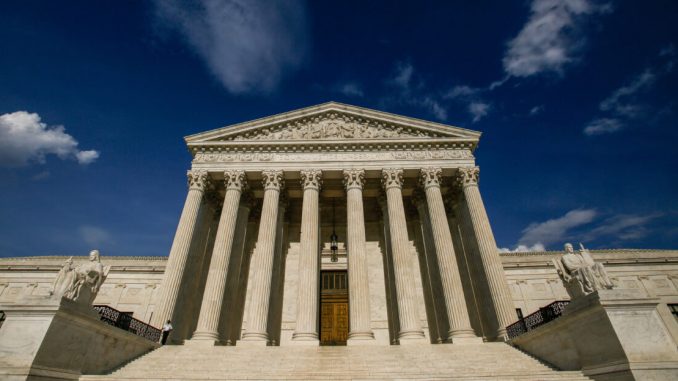

A defendant charged with illegally reentering the United States after being deported is not automatically entitled to argue the removal was invalid even if he was removed for a crime that was subsequently deemed not to be a removable offense, the Supreme Court heard.
The case, United States v. Palomar-Santiago, court file 20-437, was heard April 27.
The government was represented at the 50-minute hearing by Erica L. Ross from the U.S. Department of Justice. The respondent, Refugio Palomar-Santiago, was represented by Bradley N. Garcia.
Palomar-Santiago, a Mexican national, was granted permanent resident status in the United States in 1990. He lost that status in 1991 following a driving under the influence (DUI) conviction, which at the time was deemed an aggravated felony. He was deported and later reentered the United States without authorization.
Then the U.S. Court of Appeals for the 9th Circuit ruled that felony DUI was not a crime of violence necessitating the deportation of a permanent resident under the Immigration and Nationality Act (INA).
In 2017, Palomar-Santiago was present in the United States again and was indicted for reentering illegally after being deported. He moved to dismiss the indictment, arguing the crime for which he was originally deported was no longer a deportable offense and that his removal was therefore fundamentally unfair.
The U.S. District Court agreed with Palomar-Santiago and dismissed the indictment. The 9th Circuit affirmed that ruling on May 14, 2020, without addressing the merits of the government’s argument, which was that the 9th Circuit’s decision redefining felony DUI was wrongly decided.
During oral arguments April 27, Garcia told the Supreme Court the law here is confusing at times.
This case is “in an area where everybody concedes that the legal doctrines are mystifying and opaque,” he said.
Ross told the justices that “Congress stated that a noncitizen may not challenge the validity of his removal order unless he demonstrates that he exhausted any available administrative remedies, that the removal proceedings improperly deprived him of the right to judicial review, and that the entry of the order was fundamentally unfair.”
“Congress reasonably prohibited noncitizens from taking the law into their own hands by simply reentering the country and then challenging a prior removal order only if indicted for unlawful reentry.”
Palomar-Santiago, whose arguments now “would create a significant loophole in the statute,” should have made the case in court, as other individuals did, that his prior offense was not an aggravated felony, instead of raising it as a defense to the illegal reentry charge, Ross said.
Responding to Justice Stephen Breyer, Garcia said that his client “was unlawfully deported.”
“Regardless of the DUI conviction, everyone agrees that that is not and never was a basis to remove a lawful permanent resident from the United States. So this order is substantively invalid.”
Justice Sonia Sotomayor said to Garcia, “if you were a convicted felon and if you think the felony is void or voidable, you should go back and get it voided. Ross’s argument is don’t reenter the country until you get your removal order voided.”
This is a developing story. It will be updated.






Be the first to comment